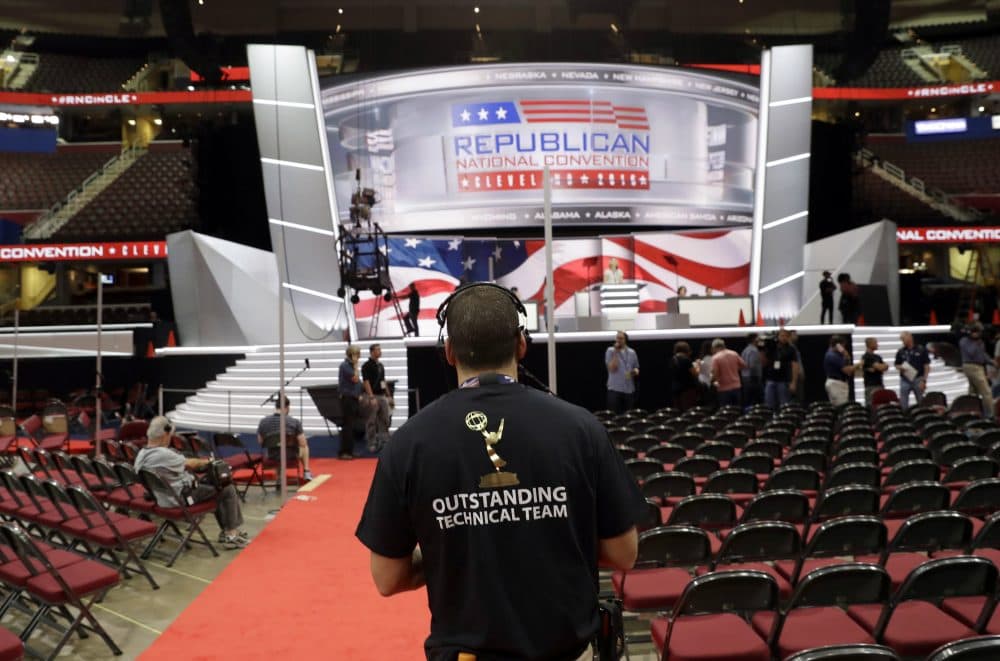Advertisement
Will The Real GOP Please Stand Up?

The lead-up to the GOP convention in Cleveland has been a virtual reflection of the party’s primary campaign: discord, irreverence, muddled communications and a still-volatile presumptive nominee pushing buttons and earning millions in free media.
That’s probably just the way Donald Trump wanted it.
Trump, the celebrity entertainer, knows that a sense of unpredictability about the convention will help draw record viewership.
He doesn’t seem to care that some in the GOP political class have taken their ball and gone home, refusing to participate in the convention. This has left a vacuum for the Trump campaign to fill with its own brand of communications and shoot-from-the-hip planning.
This very reaction of avoidance is a symptom of how GOP leadership has devolved. The party’s principles should be bigger than any one person.
The motives of Republicans avoiding the convention are nearly as numerous as the number of candidates who entered the primary.
Across the rank-and-file, they include the ideological — those who argue that Trump isn’t sufficiently conservative on principle — to the practical — establishment operatives who are upset that Trump’s people aren’t throwing business their way.
Among the elites, some lawmakers are ducking Cleveland because they’ve made a calculation to avoid the risk of down-ballot blowback. Others in the GOP political class feel betrayed by the primary electorate and personally insulted by its choice. In some cases, these elites have conveniently forgotten all of the good things the party had provided to them in the past.
What most of these Republicans have in common, however, is that they helped enable the very thing they are ostensibly opposing — an insurgent candidate reshaping the party’s process and message without much of a challenge.
Advertisement
As one of about 170 delegates for Marco Rubio to the convention, the grave disappointment is easy for this writer to understand. From this perspective, at a time when the GOP had both a well-identified need and an opportunity to diversify the party with a candidate like Rubio who is young, Latino, and offers an optimistic and well-developed policy portfolio, the presumptive nominee appears at times to be the mirror opposite.
There should be no room in the GOP nor, far more importantly, in our nation’s political discourse, for leaders to mock persons with disabilities, call into question the integrity of a federal jurist based on his ethnic heritage, or propose policies keeping persons from our shores due solely to their religious faith.
The U.S. is experiencing a period where its political leaders — starting at the very top, including the White House — rely too heavily on identity politics for electoral advantage. This cynical strategy is corrosive to our civic unity. The convention should be a moment where the GOP seizes the opportunity to directly address the challenges that now seem to manifest themselves weekly, and project a message of unity for the country. This will prove quite difficult, if not impossible, given Trump’s rhetorical track record of alienating many segments of our diverse society.
But this reality doesn’t justify Republicans sticking their collective heads in the sand. To the contrary, the convention could have served as a constructive platform for them to engage in robust debate and espouse positive principles. There’s certainly no shortage of media in Cleveland for members of the GOP who do not support the Trump train to make their case about the future direction of the party — while being actively engaged in the process.
This very reaction of avoidance is a symptom of how GOP leadership has devolved. The party’s principles should be bigger than any one person.
Pretending the convention doesn’t exist is also a missed opportunity for Republican elites to figure out what drove a record primary turnout for Trump.
Pretending the convention doesn’t exist is also a missed opportunity for Republican elites to figure out what drove a record primary turnout for Trump. A large swath of the GOP electorate apparently felt betrayed by a non-responsive leadership class. Trump tapped into a well of issues that resounded with them. The mainstream GOP elite might even learn a thing or two if it listened to some of its grassroots — many of whom are at the convention.
The themes sent forth to the nation from Cleveland will signal the road the GOP will take. The party is at an undeniable crossroads and cannot continue to bounce along its confused path. It will likely have to change materially to continue to exist as a viable contender in a competitive two-party federal system.
With so much potentially on the line, simply hiding from tough decisions at the convention in the GOP’s hour of need isn’t a promising strategy for the future.
